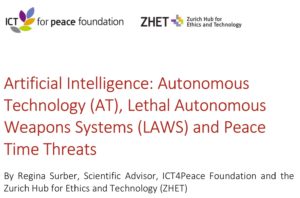
The ICT4Peace Foundation and the Zurich Hub for Ethics and Technology (ZHET) are pleased to announce the publication of the paper: Artificial Intelligence (AI): Autonomous Technology (AT), Lethal Autonomous Weapons Systems (LAWS) and Peace Time Threats by Regina Surber, Scientific Advisor, ICT4Peace Foundation and the Zurich Hub for Ethics and Technology (ZHET). The paper can be found here.
The paper also includes an Annex with eleven lists of principles for ethical/responsible research on AI, AT and Robotics.
AT can be regarded as the technological ‘essence’ of Lethal Autonomous Weapons Systems (LAWS); and the issue of LAWS is discussed by the UN CCW, with a next gathering of a Group of Governmental Experts (GGE) again in April 2018. However, the risks of AT are not limited to its use in LAWS. This paper will demonstrate further ways of the actual and potential weaponization of AT that are currently not yet fully addressed by the UN organizations. Moreover, it will carve out potential risks for global society of not-weaponized AT, and will present thought-provoking impulses that can shape an international interdisciplinary debate on the risks of AT specifically and of emerging technologies more generally (those risks were also presented at earlier presentations at ETH Zurich and Ringier).
In addition, this paper will shed light on the definitional problems of Artificial Intelligence and AT. It argues that an unquestioned ‘anthropomorphism’ (the use of originally human terms like ‘intelligence’ or ‘autonomy’ for technological artefacts) may lead to a premature overvaluation of technology and a simultaneous potential devaluation of human beings, and will present ideas for linguistic substitutes.
Overall, the paper will unearth the current paradigm shift in human technological creation and self-understanding that underlies the ongoing debate on AT and LAWS: The fact that humans are creating technological artefacts that may lose their instrumental character because we gradually give away control and responsibility for the outcomes of their usage. Locating the core challenge of AT, AI and any emerging technology in this still subtle but pervasive change in the understanding of the human-technology relationship, this paper will also provide conclusions and recommendations that are of a more general and long-term character.
The Annex includes eleven lists of principles for ethical/ responsible research on AI, AT and Robotics. Download here.
A recording of Regina Surber’s recent lecture at Ringier Zurich on this topic can be found here and a recent commentary by Regina Surber in the Neue Zürcher Zeitung (NZZ): “Autonomous Technology: The Danger Beyond Technology” can be found here.

1 Trackback